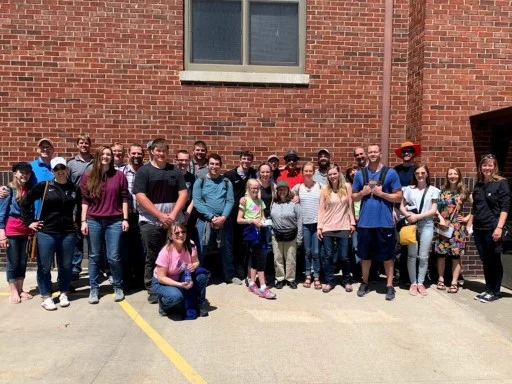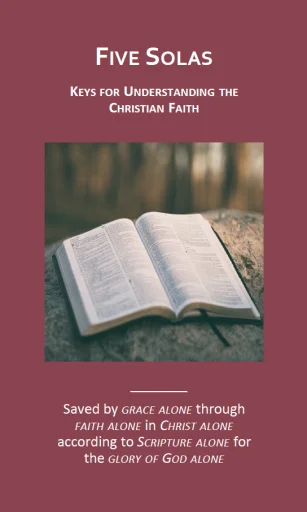In our sharing the good news of the gospel with others, even with believers, we need to remember also to minister to them. I’ve encountered those who struggle with God over the loss of a loved one and the common question regarding why a loving God would allow pain and suffering. Many grieve the loss of an unborn child, whether that is regret over an abortion or sorrow from a recent miscarriage. When we minister to them during these times, we glorify and honor God as we show His love especially in contrast to the false perception that God is a cold judge who looks at all we do wrong.
Some seek consolation in the idea they are innocent therefore God must accept them or that they are just a clump of cells and not a real person. If either of these is true, why do we still grieve and mourn over this loss? Why do we consider this a loss at all?
This can be a confusing issue for many Christians since there is no straight-forward scripture passage that we go to that explains the situation. Much like the doctrine of the Trinity, we must piece together different principles and examples to form a wholistic picture. Lets take a look.
We believe that people are people (Galatians 3:28). This goes against any kind of partiality between men and women, among races, we are all made in the image of God (Genesis 1:27). This includes children and even the unborn as we are individuals from conception forward (Psalm 139:13, Jeremiah 1:4-5, Luke 1:39-44). Therefore, we believe that the unborn who die in the womb through miscarriage or abortion or any other means are people and therefore suffer the same fate at their death as any born adult or child. When the unborn die, it is good for us to mourn their loss.
People are made in the image of God but we are not God. Mankind is different. God is sovereign, He is holy, and He has the authority to determine who goes to heaven and who goes to hell. It is not ours to say, “this miscarriage goes to heaven, but not that one”. How do we answer the question? We do have God’s revelation to us with some examples. One example is that of Jacob and Esau, twin brothers born to Isaac where God loved the one and hated the other (Genesis 25:21-23, Romans 9:10-13). This may seem arbitrary, but God’s knowledge is beyond ours. He separates the righteous from the unrighteous, all who end up in hell do so because of their own sin and disobedience (Matthew 25:46).
In fact, all are sinful (Romans 3:23), none are good of ourselves (Romans 3:9-18). Let me explain. Mankind is created in God’s image but that does not mean we are equal with God. A ruler called Jesus a good teacher, but Jesus said there are none good but God himself (Luke 18:18-19). Next, good is defined by moral perfection and the Law of God and we know that the Law is not able to impart eternal life (Galatians 3:21). Our righteousness is apart from the Law, it is obtained by Christ. David reminds us that we were conceived in sin, we were sinful from birth (Psalm 51:5, Psalm 58:3). The hard truth is that children are not innocent at birth, some will end up in hell. Even children are sinful (Proverbs 22:15). If it were not so we would have no need to train up our children (Proverbs 22:6, Ephesians 6:4).
However, we should not consider children as only wicked, unable to be redeemed. Jesus showed his care for them and teaching the disciples that “the Kingdom of God belongs to such as these” (Luke 18:16, Matthew 19:14, Mark 10:14). Peter assured us in his sermon stating, “the promise is for you and your children” (Acts 2:39) including all that God shall call, regardless of age. It is great joy to a parent that their children grow up and embrace the truth (3 John 1:4).
There is an interesting aspect as Paul writes to the Corinthians about marriage. To the Christian spouse who is married to an unbelieving spouse, he discourages them from divorce as the children are made holy because of the believing spouse (1 Corinthians 7:14). This does not mean they get a free pass, but that they are set apart as God’s and should be trained in righteousness so as adults they may believe and embrace faith in Christ. The negative conclusion here is that children of two unbelieving parents are unholy and end up in hell. Also implying that children of at least one believing parent who die before an age of understanding are considered holy and in covenant with God and thus would be taken to heaven. Same for the unborn. This is a general principle, but not a guarantee. [remember the situation above of 2 believing parents of both Jacob and Esau; both did not end up with faith]
Likewise, after David’s adulterous relations with Bathsheba they had a child and God brought judgment on them causing the child to be very ill (2 Samuel 2:15). David fasted while the child was ill that maybe God would have mercy but got once the child died he got up and ate immediately. This caused confusion among his servants and when they asked he answered, “I shall go to him, but he will not return to me.” (2 Samuel 2:22-23). This is a great comfort for a believing parent as the only way for David to go to his child is at his death, reunited in heaven. In the story of the rich man and Lazarus Jesus indicates that we cannot cross over between heaven and hell (Luke 16:26).
As we minister to the believer, we can give them hope as they will see their lost child again in heaven. To the unbeliever, this should be a call to repent and believe or likewise they will meet the same fate. If they are fully in unbelief and reject God, this may not concern them a bit.
Death is something to be mourned, it is an intruder, because of sin. We will die too. Death is a constant reminder that all will die because we are all in Adam, all dead in our trespasses. We will die a physical death, but we can escape the second death and separation from God in eternity only through putting our faith and trust in Christ. It is only in Christ that we are made alive as he takes our sin and he gives His righteousness to us. Christ has finished the work of our salvation and forgiveness of sin.
 Addressing First Amendment Free Speech in Street Evangelism
Addressing First Amendment Free Speech in Street Evangelism
 Pella Tulip Time Outreach Summary 2019
Pella Tulip Time Outreach Summary 2019
 Persecution Bill
Persecution Bill
 Five Solas Business Card
Five Solas Business Card